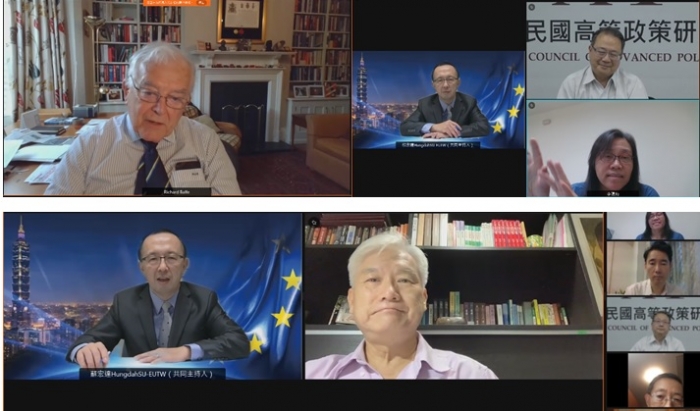On the 25th June 2021, the European Union Centre in Taiwan has collaborated with the Taiwan Association of International Relations, Association of Foreign Relations, and European Community Studies Association Taiwan to invite Lord Richard Balfe, a member of the UK House of Lords and former Member of the European Parliament, for an online session. Lord Richard shared his insights on the values of democracy and the challenges faced over time, and his observation regarding the development of democratic alliances today. The online session with Lord Richard was after the G7 summit in the UK, the session aimed to understand the current challenges to democratic values under the COVID-19 pandemic and related developments. The organizer has special invited Chyungly, Lee, Research Fellow at the Institute of International Relations, National Chengchi University, and Professor Alexander Huang, Associate Professor of Graduate Institute of International Affairs and Strategic Studies, Tamkang University, who engaged in a dialogued with Lord Richard Balfe. Following the discussion, a forum in Chinese will be provided to let more publics understand the topics addressed.
The speech and discussion titled “The Evolving Challenges to Democratic Values, Building New Coalition”. Although the speech was affected by the COVID-19 Level 3 Alert guidelines, we managed to hold online via Webex. The online session has attracted over a hundred online viewers. Professor Hungdah, Su, Director of the European Union Centre in Taiwan, and Ambassador Andrew Hsia, chairman of the Association of Foreign Relations delivered opening speech and introduced Lord Richard Balfe. In the session, our former Minister of Foreign Affairs of Taiwan, Mr. David Lin has mentioned that the supportiveness of Lord Richard to our activities.
In his speech, Lord Richard reflected on his experiences in diplomacy and security, then he explained the development of the European Union post World War II, examining the challenges faced by the EU at different stages. He emphasized that the value of democracy lies in enabling people to engage in peaceful communications, which strengthens democratic development through the movement of people and ideas. However, the risen of Mainland China with the policy of Belt and Road, it focuses on economic dominance rather than communications, it can be seen from the inspect of Mainland China invested in sectors such as 5G in Europe. United Kingdom, Australia faced diplomatic pressure due to China’s economic influence. Lord Richard concluded by discussin.g the Comprehensive and Progressive Agreement for Trans-Pacific Partnership (CPTPP), he noted as beneficial for defending democratic values by offering an alternative for countries under pressure.
The Q&A session focused on how Europe perceives the development of the Chinese Communist Party, the debate over the “Beijing Consensus” and “China Model”, and the appeal of governance efficiency during the pandemic. Participants also discussed the Indo-Pacific strategy, US-Europe relations, US-Russia interactions, and the role of the Biden administration in these dynamics. Additionally, there was interest of the British government’s plan to form a “D10” alliance of ten democratic countries, Taiwan monitored closely on the alliance. The discussion was truly engaging and lively, though time constraints inevitably left some topics unexplored. Nonetheless, the enthusiasm of the participants reflects on the discussion session.
The European Union Centre in Taiwan is a consortium led by National Taiwan University,
National Chengchi University, National Chung Hsing University, National Sun Yat-sen University, National Dong Hwa University, Fu Jen Catholic University, and Tamkang University. It serves as a platform for EU-related academic exchanges, recognized by the European Union, and forms part of a global network of EU research centres. For more information about the centre, please our website https://www.eutw.org.tw.


Social links